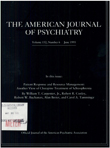Is weight phobia always necessary for a diagnosis of anorexia nervosa?
Abstract
Several reviews of the history of anorexia nervosa have concluded that weight phobia, a basic diagnostic criterion for the disorder, did not emerge as a predominant motive for food refusal until around 1930. In addition, investigators have reported cases of self-starvation without apparent weight phobia in non-Western cultures. Three explanations have been proposed for these findings: 1) patients who do not demonstrate a definite weight phobia are in fact suffering from an eating disorder not otherwise specified, 2) weight phobia has been overlooked or concealed, and 3) there has been a transformation in the content of anorexia nervosa in the West and an analogous situation may be occurring in the developing countries. The authors conclude that a change in the core features of anorexia nervosa in Western cultures since 1930 can be demonstrated. They explore the question of whether anorexia nervosa would be the same illness if the criterion of weight phobia were not required and conclude that anorexia nervosa may be conceptualized in several different ways without including the phenomenon of weight phobia or body image disturbance. Finally, they recommend that because the desire for thinness appears to be culture- bound, anorexia nervosa is the best disorder to use in examining the influence of culture on psychopathology. Therefore, cases of self- starvation in non-Western cultures should be studied carefully because they may clarify the core features of anorexia nervosa.
Access content
To read the fulltext, please use one of the options below to sign in or purchase access.- Personal login
- Institutional Login
- Sign in via OpenAthens
- Register for access
-
Please login/register if you wish to pair your device and check access availability.
Not a subscriber?
PsychiatryOnline subscription options offer access to the DSM-5 library, books, journals, CME, and patient resources. This all-in-one virtual library provides psychiatrists and mental health professionals with key resources for diagnosis, treatment, research, and professional development.
Need more help? PsychiatryOnline Customer Service may be reached by emailing [email protected] or by calling 800-368-5777 (in the U.S.) or 703-907-7322 (outside the U.S.).



